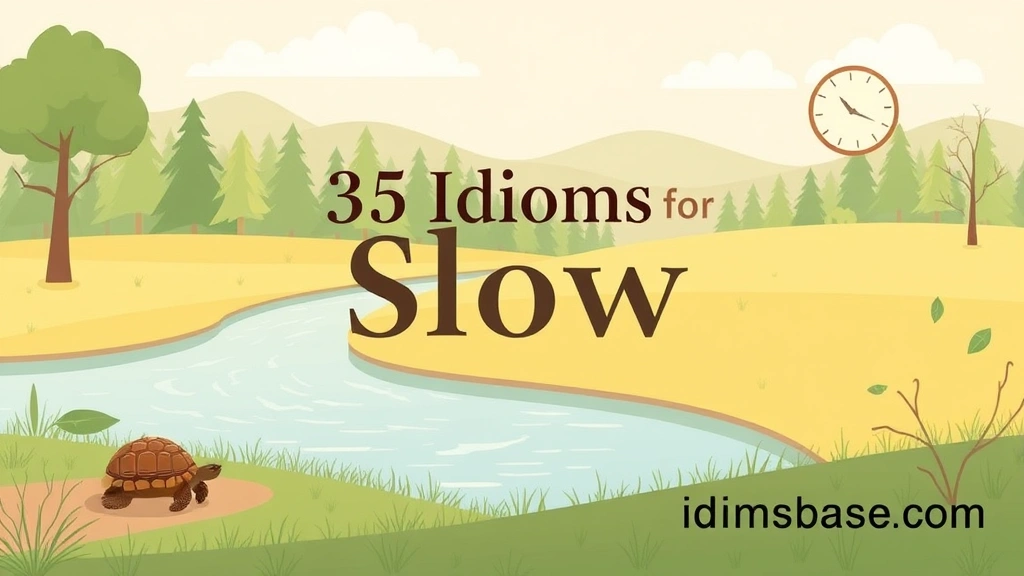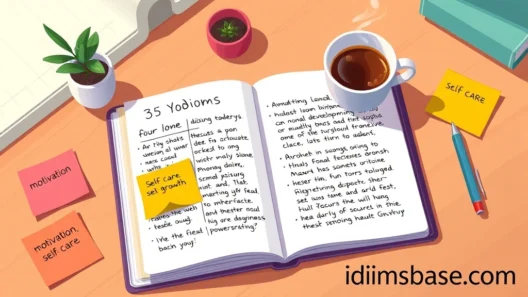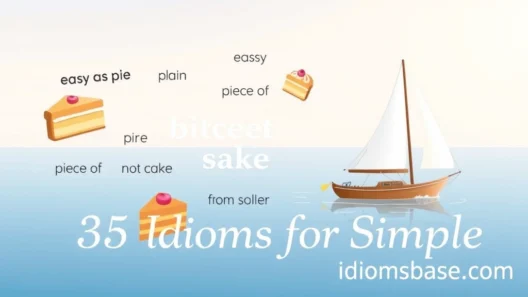Have you ever felt like time is moving at a snail's pace? Or maybe you've been stuck in a situation where progress just isn't happening? We've all been there! English is full of colorful expressions to describe slowness, and mastering them can really add a sparkle to your conversations and writing. Getting a handle on these idioms will not only make you sound more like a native speaker but also open up a whole new world of understanding.
In this fun and engaging guide, we're diving into 35 fantastic idioms that perfectly capture the essence of being "slow." Whether it's about a person, a process, or even a thought, these phrases will give you the perfect words to describe it. Get ready to expand your vocabulary and express yourself with more precision and flair!
Understanding "Slow": Why So Many Idioms?
It's fascinating, isn't it, how many ways we have to say something is slow? This isn't just a linguistic quirk; it reflects how often we encounter slowness in our lives. From a sluggish internet connection to a slow-moving queue, or even someone who's a bit slow on the uptake, these situations are common. Our language adapts to give us specific, vivid ways to describe these everyday experiences.
Think about it: "slow" can mean many things. It can be about speed, understanding, growth, or even development. Each idiom offers a unique nuance, painting a more precise picture than just the word "slow" alone. They add character, humor, and sometimes even a touch of frustration to our descriptions!
Why Learn Idioms?
Learning idioms is like unlocking a secret code to a language. They're often figurative, meaning their meaning isn't obvious from the individual words. This is why they can be tricky, but also why they're so rewarding to learn!
- Sound more natural: Native speakers use idioms all the time.
- Understand more: You'll grasp conversations and media better.
- Add flair to your speech: Make your language more expressive and interesting.
- Connect culturally: Idioms often reflect cultural observations and historical context.
35 Idioms for "Slow"
Let's explore these wonderful idioms, complete with their meanings and how you can use them in a sentence. You'll be using them like a pro in no time!
Idioms Describing Slow Speed or Movement
1. At a snail's pace
Meaning: Extremely slowly, like a snail.
Example: The traffic was moving at a snail's pace, so I knew I'd be late.
2. Like watching paint dry
Meaning: Extremely boring and slow.
Example: The meeting was like watching paint dry; nothing interesting happened.
3. Slow as molasses in January
Meaning: Very, very slow, implying something is stuck or sluggish due to conditions.
Example: The old computer runs as slow as molasses in January.
4. To drag one's feet
Meaning: To be deliberately slow in doing something, often because you don't want to do it.
Example: He's really dragging his feet on this project; he clearly doesn't want to finish it.
5. To take one's time
Meaning: To do something without hurrying.
Example: Don't rush; take your time and do it right.
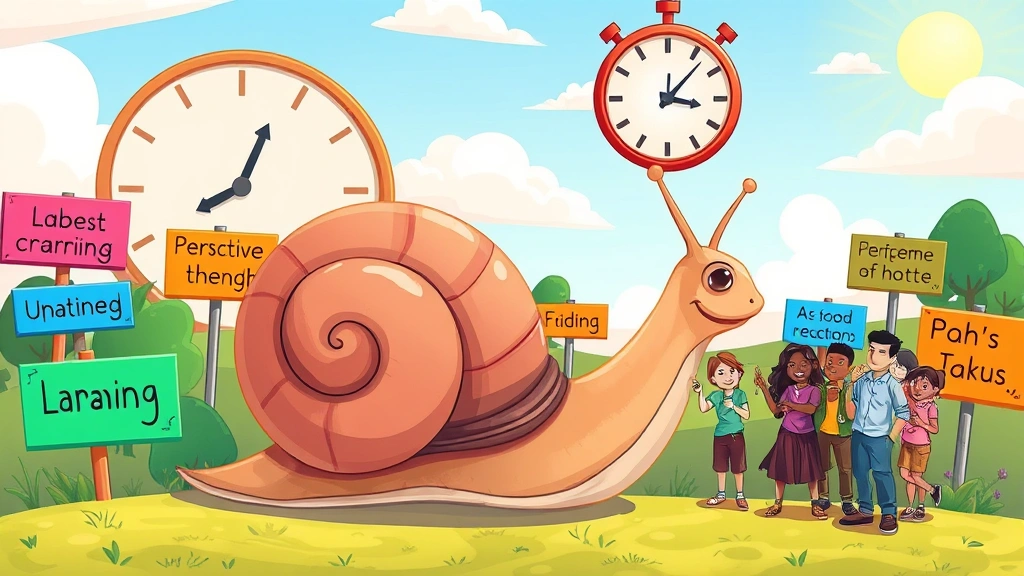
6. In low gear
Meaning: Operating at a slow speed or low level of activity.
Example: After the holiday, the whole office was in low gear for a few days.
7. To crawl along
Meaning: To move very slowly, often with difficulty.
Example: The car was crawling along the icy road.
8. To potter about/around
Meaning: To do small, unimportant things in a relaxed and unhurried way.
Example: She spent the afternoon pottering about in the garden.
9. To dawdle
Meaning: To waste time; to move slowly and aimlessly.
Example: Stop dawdling and get ready for school!
10. To trudge
Meaning: To walk slowly and with heavy steps, typically because of exhaustion or harsh conditions.
Example: We trudged through the deep snow.
Idioms Describing Slow Understanding or Learning
11. Slow on the uptake
Meaning: Slow to understand or grasp new information.
Example: You have to explain things carefully to him; he's a bit slow on the uptake.
12. To click (or not click)
Meaning: For something to suddenly be understood (or not).
Example: I explained it three times before it finally clicked for him.
13. To be a slow learner
Meaning: Someone who takes longer than others to acquire new skills or knowledge.
Example: She's a slow learner when it comes to math, but she's very determined.
14. To be a bit thick
Meaning: Informal way to say someone is unintelligent or slow to understand.
Example: I tried to explain the joke, but he's a bit thick sometimes.
15. To be dense
Meaning: To be unintelligent or slow to understand.
Example: How can you be so dense? I just told you the answer!
Idioms Describing Slow Progress or Development
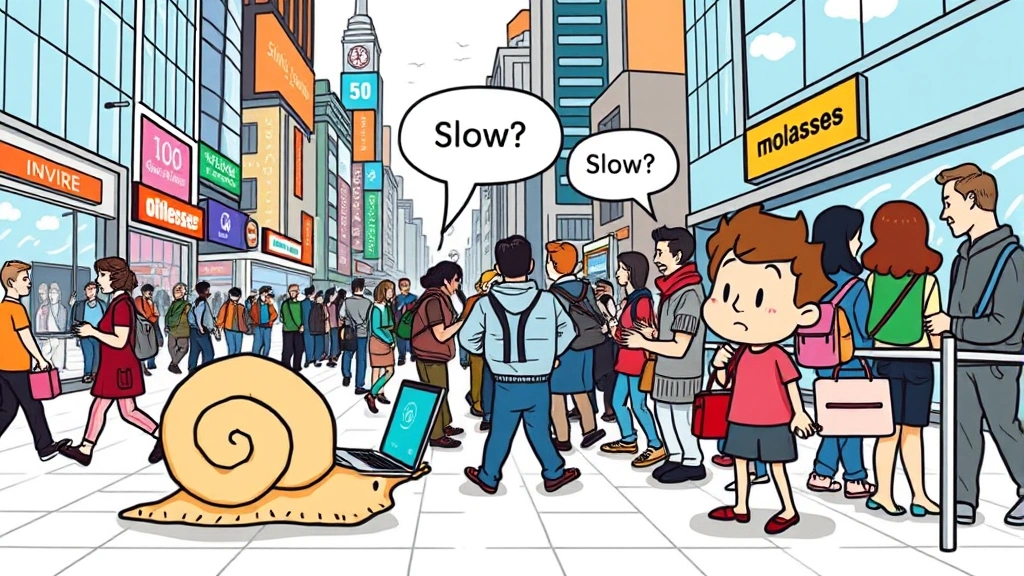
16. To get off the ground (or not)
Meaning: For a project or plan to begin successfully or make progress.
Example: Our new initiative is struggling to get off the ground.
17. To be stuck in the mud
Meaning: To be unable to make progress or move forward.
Example: The project is stuck in the mud because of budget issues.
18. To be in a rut
Meaning: To be in a fixed, boring way of life or pattern of behavior that is difficult to change.
Example: I feel like I'm in a rut with my career; I need a change.
19. To be at a standstill
Meaning: To be completely stopped; no progress is being made.
Example: Negotiations are at a standstill.
20. To spin one's wheels
Meaning: To expend a lot of effort without making any progress.
Example: We've been spinning our wheels on this problem for hours.
21. To hit a brick wall
Meaning: To encounter an insurmountable obstacle or difficulty that prevents further progress.
Example: I've hit a brick wall with my research; I can't find any more information.
22. To be bogged down
Meaning: To be stuck and unable to make progress, often due to too much work or difficulty.
Example: We're bogged down with paperwork.
23. To take forever
Meaning: To take an extremely long time.
Example: This queue is taking forever!
24. To be a long shot
Meaning: Something that has a very small chance of success. (While not directly "slow," it implies a difficult, drawn-out path to potential success).
Example: Getting that job is a long shot, but I'm going to try anyway.
25. To drag on
Meaning: To continue for a longer period than is necessary or desirable.
Example: The meeting dragged on for hours.
Other Nuances of "Slow"
26. To be behind the times
Meaning: To be old-fashioned or not up-to-date with current trends or knowledge.
Example: His ideas are a bit behind the times.

27. To be a late bloomer
Meaning: Someone who develops skills or talents later than others.
Example: He was a late bloomer in sports, but now he's an excellent athlete.
28. To be slow to anger
Meaning: To be patient and not easily provoked.
Example: My grandfather is slow to anger; it takes a lot to upset him.
29. To be slow to react
Meaning: To respond slowly to a situation.
Example: The company was slow to react to the changing market.
30. To go at one's own pace
Meaning: To work or proceed at a speed that feels comfortable and natural for oneself.
Example: Don't worry about keeping up with others, just go at your own pace.
31. To put the brakes on
Meaning: To make something slow down or stop.
Example: We need to put the brakes on spending until we have more funds.
32. To ease off/up
Meaning: To reduce the intensity or speed of something.
Example: You should ease off the accelerator as you approach the bend.
33. To wind down
Meaning: To gradually slow down and prepare to stop or relax.
Example: The party started to wind down around midnight.
34. To go from zero to sixty (or not)
Meaning: To accelerate very quickly (or to be unable to).
Example: That old car can't go from zero to sixty in under a minute.
35. To take a back seat
Meaning: To take a less important or active role, allowing others to lead. (Implies a slowing down of one's own direct involvement).
Example: After years of leading the company, she decided to take a back seat.
Key Takeaways
- Variety is the spice of life: English offers a rich tapestry of idioms to describe different facets of "slowness."
- Context is key: The meaning of "slow" can vary greatly, from literal speed to understanding, progress, or even temperament.
- Idioms add color: Using these expressions makes your language more vivid, natural, and engaging.
- Learning is a journey: Don't rush; take your time to learn and practice these idioms!
| Idiom Category | Examples | What it Emphasizes |
|---|---|---|
| Speed/Movement | At a snail's pace, like watching paint dry, slow as molasses in January | Literal speed, or lack thereof, often boring |
| Understanding/Learning | Slow on the uptake, a slow learner, a bit thick | Cognitive processing, comprehension |
| Progress/Development | Stuck in the mud, at a standstill, to spin one's wheels | Lack of advancement, stagnation |
| Other Nuances | Behind the times, late bloomer, slow to anger | Being outdated, delayed development, temperament |
Frequently Asked Questions (FAQs)
Q1: What is an idiom?
A: An idiom is a phrase or expression whose meaning cannot be understood from the ordinary meanings of its individual words. It's a figurative expression that has a commonly understood meaning within a particular culture or language. For example, "kick the bucket" means to die, not literally to kick a bucket.
Q2: Why are idioms so important in English?
A: Idioms are crucial because they are a fundamental part of everyday conversation for native speakers. They add richness, nuance, and humor to language. Understanding and using idioms correctly can significantly improve your fluency, comprehension of spoken English, and cultural understanding. Without them, conversations can seem stiff or formal, and you might miss the true meaning of what someone is saying.
Q3: How can I learn and remember these idioms effectively?
A: There are several effective strategies!
- Contextual learning: Don't just memorize definitions. Try to understand the situations in which each idiom is used.
- Practice using them: Actively try to incorporate them into your own sentences, both in speaking and writing. Start with just a few at a time.
- Listen and read: Pay attention to how native speakers use idioms in movies, TV shows, podcasts, books, and articles.
- Flashcards: Create flashcards with the idiom on one side and its meaning and an example sentence on the other.
- Visual associations: Try to create a mental image for each idiom, even if it's silly. For "at a snail's pace," imagine a tiny snail trying to cross a huge road!
- Group similar idioms: Like we've done here, grouping them by theme can help you see similarities and differences.
Q4: Are these idioms formal or informal?
A: Most of the idioms on this list are considered informal or neutral, meaning you can use them in casual conversations with friends, family, and colleagues. However, some, like "to be a bit thick" or "to be dense," are quite informal and could even be considered rude depending on the context and tone. Always consider your audience and the situation before using an idiom. When in doubt, stick to the more universally accepted ones.
Q5: Can I use these idioms in written English, like essays or reports?
A: It depends on the formality of your writing. For creative writing, informal emails, or blog posts, using idioms can make your writing more engaging and relatable. However, for formal academic essays, business reports, or professional documents, it's generally best to avoid idioms as they can sometimes be perceived as imprecise or too casual. In such cases, opt for more direct and literal language.
Q6: Do all idioms translate directly into other languages?
A: Rarely! Idioms are deeply rooted in the culture and history of a language, so direct translations almost never work. A literal translation of an idiom often makes no sense or means something entirely different in another language. This is why learning idioms requires understanding their figurative meaning, not just the individual words. It's part of what makes language learning so fascinating!
Q7: What's the difference between an idiom and a proverb?
A: While both are common expressions, they serve different purposes. An idiom is a phrase whose meaning isn't literal and often describes a situation or action (e.g., "to hit a brick wall"). A proverb is a short, well-known saying that expresses a general truth or piece of advice (e.g., "Actions speak louder than words" or "A stitch in time saves nine"). Proverbs usually offer wisdom or a moral lesson, whereas idioms are more about descriptive language.



